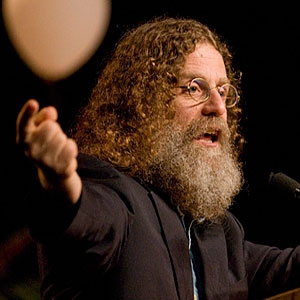

If you had a gun in one hand and Adolf Hitler in the other, what would you do?
“I’m going to start off by telling you guys a fantasy,” said Robert Sapolsky, neuroendocrinologist and author, to begin his talk on Monday. “I’m single handedly fighting my way to a secret bunker. There’s a person in there and he’s holding a pistol. I knock it out of his hand. He snarls at me, we wrestle, we grapple, I manage to get him to the ground, [get] his hands behind his back in handcuffs and get to say ‘Adolf Hitler, I arrest you for crimes against humanity.’”
Sapolsky spoke to DePauw students and faculty about the science of human behavior based off of his new book, “Behave.” His presentation focused on the reasons why, unlike other species, humans “hate certain kinds of violence” and approve of the “right kind of violence,” such as killing Hitler. Humans, he said, are both “miserably violent and compassionate.”
According to Sapolsky, the biology behind human behavior all comes down to context. To understand why a behavior occurs, one must first look at what occurs in an individual’s brain. The amygdala provokes aggression, fear and anxiety and is responsible for reacting to perceivably scary situations. The insular cortex tells the amygdala if the situation agrees or disagrees with one’s morals. Humans are unique because they can “distinguish moral action” and “one person’s moral disgust is not the same as another’s,” Sapolsky said.
The frontal-cortex, dopamine system and fusiform cortex of the brain also play a role in human behavior. Again, depending on context, the frontal-cortex regulates self-control and deems if a situation is good or bad, or “value free.” Similarly, dopamine increases if an action is seen as potentially rewarding in their viewer’s eyes.
“Righteous punishment really ignites dopamine,” Sapolsky said. Finally, the fusiform cortex and anterior cingulate identify faces and process empathy, determining if violence is acceptable depending on “who’s face and who’s pain.”
Sapolsky also described how human behavior can often be predicted based on what an individual experienced minutes, hours, months and even years before. Factors such as how hungry one is to how they were treated during childhood can be predictors of how an individual will behave. Behavior can even be traced back to fetal life and ancestry. “No species is freer of genes,” Sapolsky said, because “every organism lives in one type of environment, except us!”
Alexander Komives, professor of physics and astronomy, was fascinated by Sapolsky’s ideas. He especially enjoyed listening to Sapolsky’s true life examples of how human behavior can change even despite biology and context. “It gives one pause to think about...I’ll think about [it] for a while,” he said.
First-year Robert Krauss was interested in the talk because he had heard a little bit about the science behind human behavior and wanted to learn more. “The most interesting part for me was to see how mothers can transfer stress as a biological behavior from a physical behavior,” Krauss said, adding that he appreciated the depth of Sapolsky’s ideas. “It’s really cool to see a much more fleshed-out abstraction of behavior science.”
First-year Arham Azeem was recommended by one of his friends to attend the talk. “A lot of the things he [Sapolsky] justified through examples were very convincing to me,” Azeem said. Azeem was struck by how much the past impacts individual’s behavior today. “If you’re not learning from history, how will you behave?”
Sapolsky concluded his talk by emphasizing that the single most important thing to remember is that human behavior, although seemingly predictable, is complicated. Regardless, individuals must not forget the importance of both biology and historical context when studying how humans behave.
“Those who study history and science of human change are destined to not be able to repeat it,” Sapolsky said.
